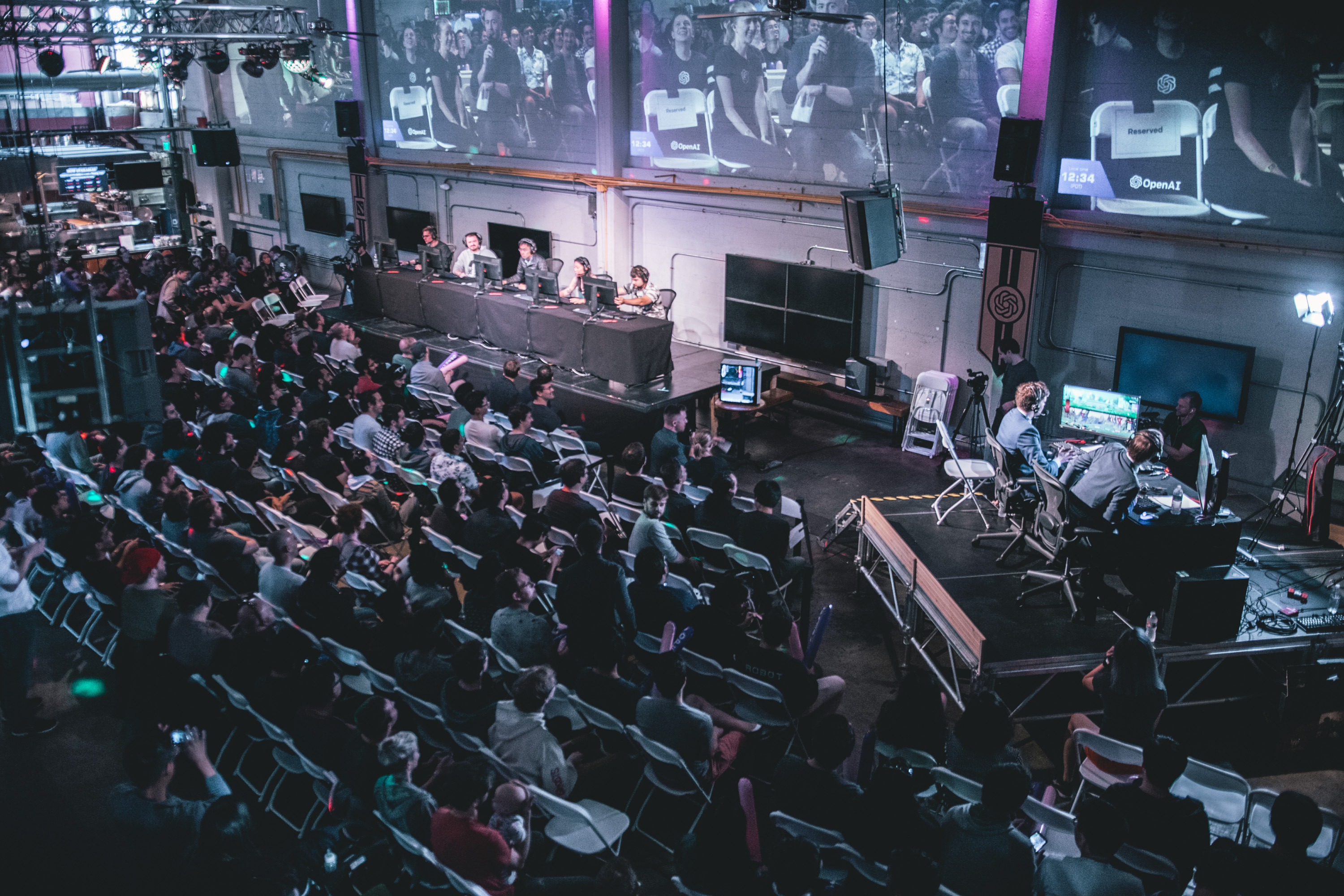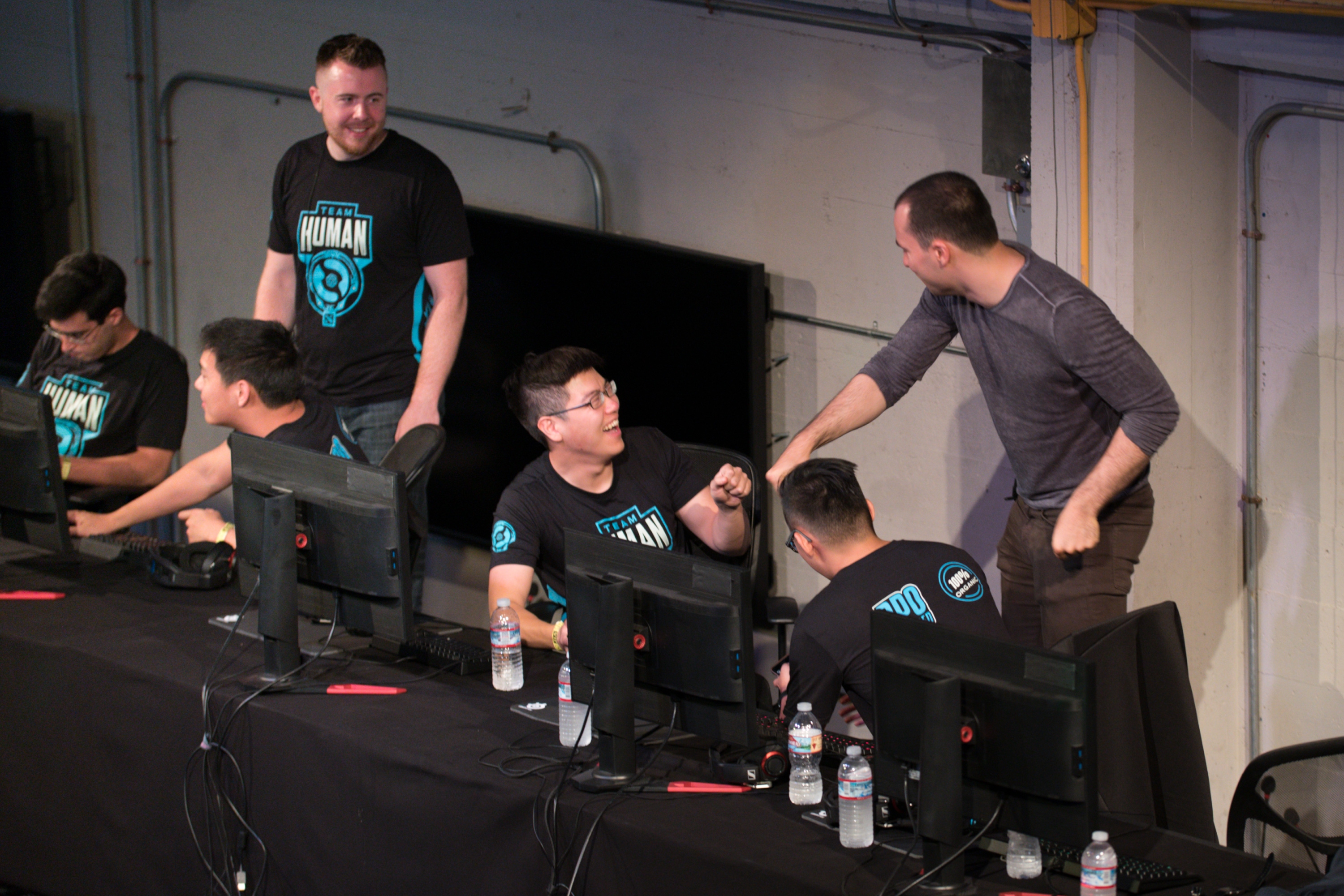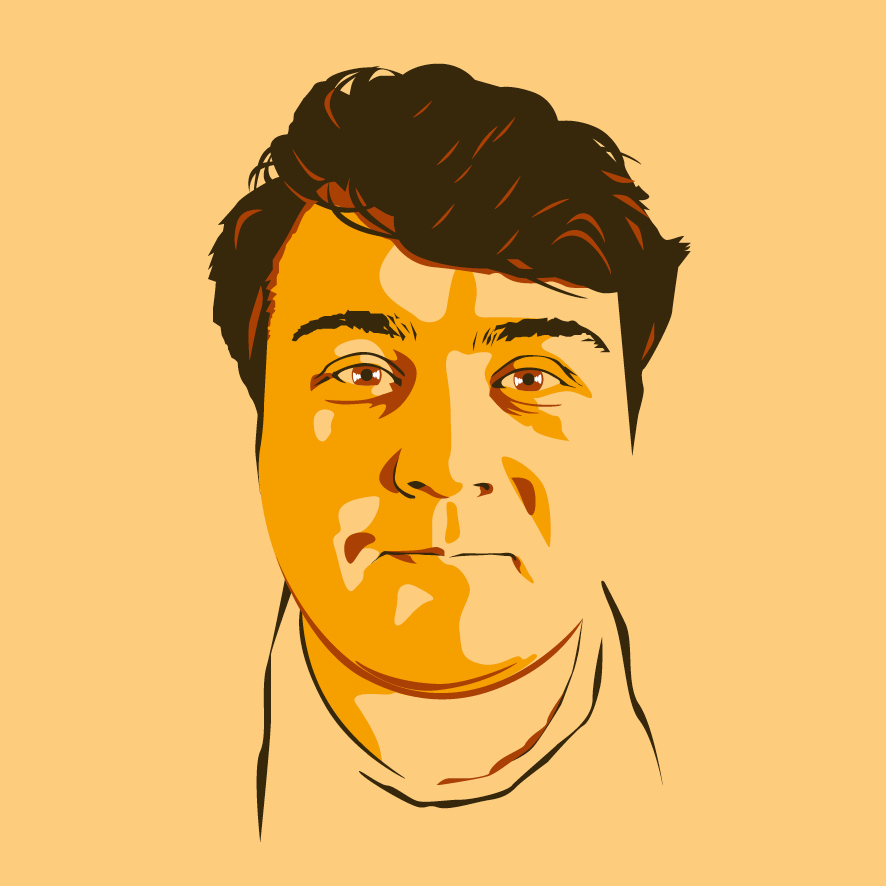How the OpenAI Five tore apart a team of Dota 2 pros
We talked to the players and the OpenAI engineers about what it was like to build and face off against a fearsome Dota bot.

Last weekend, five very good Dota 2 players gathered in San Francisco to play a competitive match—against a computer. Their opponent was OpenAI Five, five neural networks which have been training a bit harder than the average Dota player to learn how to be a competitive team: "OpenAI Five plays 180 years worth of games against itself every day, learning via self-play," says the OpenAI blog. I had no idea who would win, but I wanted to be there in person to find out.
If you try to beat it mechanically, it’s not possible. You’d have to use the fog and items and skillsets in a way it won’t expect.
MoonMeander
Some people at the event thought OpenAI would have some clear weak points that could be exploited by its human opponents. Others worried the humans would stand no chance against the quicker mind of the machine. Most people I talked to just said “I really don’t know what to expect,” with that excited and anxious feeling that comes with a good mystery.
This benchmark event was a big deal for OpenAI, a non-profit company co-founded by Elon Musk. It was the first time their Dota 2 AI would be stepping into the spotlight since The International 2017, where it was able to defeat legendary pro player Dendi in a 1v1 showdown. That was impressive, fans agreed, but it wasn’t “real” Dota. Now, a year later, the AI has advanced enough to take on high-level players in a more realistic 5v5 format with some tweaked rules and a limited hero pool of 18.
Before the match, the players comprising Team Humans (Blitz, Cap, Merlini, MoonMeander, and Fogged) were excited about going up against an AI. Most of them are former pro players who have since moved to professional casting, but their overall MMR still places them in the 99.95th percentile of Dota 2 players. If OpenAI could beat them, it’d be significant.
“If you try to beat it mechanically, it’s not possible. You’d have to use the fog and items and skillsets in a way it won’t expect,” said MoonMeander. The team agreed that the laning phase would be the hardest challenge in the match. “If [the AI] is as good as it was in the 1v1 with perfect denies, then we need to make sure it doesn’t snowball out of control,” he added.
When asked what they think their chances were, the group was unsure. “Not zero,” said Merlini with a laugh. Fogged chimed in lightheartedly with “20 percent, come on!” MoonMeander didn’t want to say for sure, but said, “I do think that we stand a chance. I feel like there are some aspects of the game that the bot can’t achieve, but we have to outplay them big time to win this.”
OpenAI staff were also hesitant to call the match for sure, but they were feeling good about the progress the AI had made. “We’re feeling strong, but to be honest, it could go either way,” said OpenAI technical staff Filip Wolski. “The value of this match is seeing how the bot plays against really good humans.”
The biggest gaming news, reviews and hardware deals
Keep up to date with the most important stories and the best deals, as picked by the PC Gamer team.
As the first match began, all eyes were on the AI. It wasn’t long before the humans’ fears were confirmed. The AI had a knack for instigating fights with precision and speed. By ten minutes in, the AI was leading in kills 13 to 4 with a consistently higher net worth. The humans put up a good fight with some smart takedowns here and there, but were consistently unable to deal with the AI when coordinating as a group. In the clip below, you can see the level of precise action the humans had to deal with as OpenAI turns a fight initiated by Fogged into a team wipe in its favor.
After the team wipe, the writing was on the wall. Following another big failed defense at their base, Team Humans called “GG” at the 21-minute mark.
Going into game 2, we got to take a look behind the curtain of the AI’s decision-making process during the team draft, including which heroes it thought the humans would choose, with a percentage chance attached to each. By the time the rosters were decided, the AI predicted a 76 percent chance for victory. But after a strong start in the opening minutes, it shot up to 92 percent.
Match 2 was mostly more of the same, with the humans trying to keep up and learn the quirks of their artificial opponent. They were able to put up a much better fight in the laning phase this time around, better utilizing the areas of play the AI wasn’t great at reacting to. This worked especially well in the clip below, in which a well-timed fissure blocked the path of the AI. Instead of trying to escape, the AI stood there, perhaps confused about what just happened but nonetheless aware of its imminent demise.
The AI also showed a lack of intuition when it came to invisibility and warding. On several occasions the humans were able to disengage with invisibility with little resistance and the AI would often place wards in awkward spots that weren’t useful in the situation. This is a weakness that OpenAI is more than aware of and is working to improve with future iterations.
Tricking the AI only got the human team so far. After 20 minutes, the AI’s heroes had snowballed into powerhouses with more than double the kill count. Victory came after 24 minutes, but this time, the crowd was less enthused. It was a good showing, sure, but at this point the whole thing was starting to feel a little unfair.
With a lot of teams, they’ll walk up and think ‘wait, are we stronger, are we better than them?’ It would just instantly start attacking.
Fogged
The festivities concluded after a lighthearted third match that allowed the Twitch chat to draft the AI team this time around. After choosing an awful composition, the AI put its chances at about 2.9 percent. And it was right on the money as the humans were able to secure a pretty easy victory. To the crowd, which had gone from cheering for the “little AI that could” to a complete “down with the robots” demeanor, the third match was somewhat cathartic. It was a heavily qualified victory, sure, but an appreciated morale boost against our future AI overlords.
Sitting down to chat after the day was done, Fogged, MoonMeander, and Merlini had a lot to unpack. “With a lot of teams, they’ll walk up and think ‘wait, are we stronger, are we better than them?’ No, [the AI] would just instantly know,” Fogged said. “It would just instantly start attacking, pushing in, and wrap around behind you and kill you.”
After three matches, they had begun to see some patterns in how the AI prioritized certain targets. But in their eyes, a lot of it came down the AI having no hesitation—no fear. Merlini recounted, “We didn’t expect them to dive so much. I got dove right as the first creep wave hit—that doesn’t happen so often in normal play. It kinda takes a while to get used to.”
MoonMeander brought up an especially poignant moment during the second match that indicated just how far beyond human the AI was playing. “There was one time when I was about to fissure kill a Lion and the courier came at the frame-perfect moment, delivered a salve, and it instantly used it. No way a human could have done that. No way.” You can watch this moment below. Fogged was quickly able to pick up the kill afterwards.
Merlini also pointed to the lack of illusions and something that helped the AI. “[The AI] never had to guess whether or not somebody is real. ‘Should we waste our spells on them?’ No, it would just know ‘this is a player, we’re killing them’ every single time.” The players initially thought that illusions weren’t allowed because the AI would have a tough time telling real players apart, but they later learned that OpenAI thought it would be too hard on the humans. There were concerns that the AI would be able to perfectly control multiple units at a time in a way that a human never could.
Team Humans wasn’t convinced that they would ever be able to best the AI under the same conditions. “I’d say if they draft, we’d have probably a five percent chance,” Fogged said. “I think if somehow we got the chances to fifty-fifty, that would be the coolest game ever.” When asked how OpenAI Five could ultimately be used in the future, MoonMeander sees it as a training tool more than anything else. “If they manage to get it to play with all the heroes and all the items in the game, as a pro player, I would like my team to scrim against it. Not a whole game, but a scrim for the first ten minutes to see how strong our lineup is for the laning phase. To see what it takes to counter our heroes.”
For OpenAI, the Dota project has always been about challenging the AI to self-learn using one of the most complicated games in the world. Overall, they’re aiming to build the best AGI (artificial general intelligence) they can. “On the road there, we try to pick problems that will bring us closer to that general intelligence. In this particular case, with Dota 2, it’s a very complex environment where nobody before was able to get AI [to this point] before,” said Wolski after the match.

Even if the Dota AI goes on to beat the very best players in the world, technical staff member Jie Tang thinks that won’t be the end. “I think the algorithms and ideas behind it we’ll continue working on for a while. It’s going to be about picking the next challenge that may be impossible, but not too impossible and trying to see how much traction we can make on it,” he said. “There’s a whole wide world of human capabilities that we can start to tackle one by one.”
When asked if the AI has a chance against pros in The International 2018, Fogged confidently said: “The bots will win.” MoonMeander believes the humans will have trouble at first, and maybe lose a few matches, but will eventually figure out their draft and strategies to bring it closer to a fifty-fifty shot. Either way, it should be a spectacle for the MOBA ages.

Morgan has been writing for PC Gamer since 2018, first as a freelancer and currently as a staff writer. He has also appeared on Polygon, Kotaku, Fanbyte, and PCGamesN. Before freelancing, he spent most of high school and all of college writing at small gaming sites that didn't pay him. He's very happy to have a real job now. Morgan is a beat writer following the latest and greatest shooters and the communities that play them. He also writes general news, reviews, features, the occasional guide, and bad jokes in Slack. Twist his arm, and he'll even write about a boring strategy game. Please don't, though.

